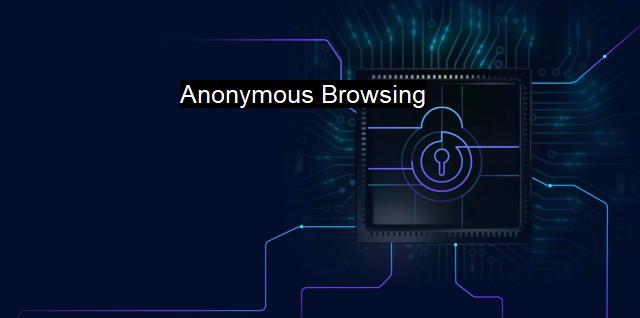What is Anonymous Browsing?
Staying Safe Online: The Importance of Anonymous Browsing for Cybersecurity and Antivirus Protection
Anonymous browsing refers to the online practice of hiding user information from the websites and services you interact with, making it difficult for the web entities, third parties, or internet service providers to track your online activities or expose your personal details. This is particularly important for ensuring internet safety, reducing potential cyber threats, and upholding the ethics of cybersecurity.In today's digital environment, user data is a precious commodity in high demand. Businesses are eager to gather as much data as they can to personalize the customer experience and advance their market strategies. Social media sites, commercial sites, news portals, and other online platforms often try to monitor user activities to display targeted advertisements or compile personalized recommendations. users may wish to avoid this pervasive surveillance owing to a wide range of privacy concerns. This is where anonymous browsing comes to the rescue.
Anonymous browsing is about making oneself 'invisible' or 'unremarkable' on the internet. When one browses the web anonymously, online trackers and cookies fail to capture or store data related to their browsing habits, physical location, device information, IP address, or other identifiable features. As a result, it becomes virtually impossible for a potential hacker or any malignant entity to link those internet connections back to the user, thereby ensuring the user’s anonymity.
Anonymous browsing not only assures the protection of personal information but also takes cybersecurity to the next level. It significantly reduces the chances of becoming a target of various cyber threats such as identity theft, phishing, harmful malware or ransomware attacks, since hackers largely rely on these pieces of user information to undertake their hazardous operations. Not to mention, data traced by trackers can be used to craft persuasive 'phishing' emails, a considerable threat in the cyber world that tricks users into unknowingly sharing sensitive information.
Several methods can facilitate anonymous browsing. One of the most commonly used ones is Virtual Private Networks or VPNs. A VPN hides your original IP address by assigning you a new one, effectively masking your identity and location. You can be in any part of the world and use a VPN to appear as if you were surfing the internet from another country. This noticeably minimizes the potential of anyone tracking your online behavior.
Similarly, several internet browsers have taken initiatives to ensure user anonymity. For instance, browsers like Tor (The Onion Router) keep user information concealed by bouncing your connection through several different computers around the globe before accessing the data you requested. This makes it difficult for anyone to trace your digital activity back to you. Comparable features can be found in many mainstream browsers, allowing users to surf the internet in ‘incognito’ or private mode.
Antivirus software is crucial in accompanying and supplementing anonymous browsing. While the latter achieves the objective of hindered tracking, an effective antivirus can shield your device from rogue software and malicious code you might encounter during your anonymous digital ventures. Up-to-date antivirus applications not only detect and clean malware but often also actively thwart attempts of intrusion, and specifically phishing or scam, providing a more comprehensive layer of protection to anonymous browsing.
Anonymous browsing is an effective way of ensuring your cybersecurity and safeguarding your internet activities against unwarranted invasions. It emphasizes the importance of privacy, an essential right in the face of today’s cyber-threat landscape. it should be acknowledged that while anonymous browsing can offer an essential layer of protection, it is not completely infallible, and should ideally be supplemented with robust antivirus software for a full-proof cybersecurity approach. The relevance of anonymous browsing in this era of pounds of data being created every second, underscores the belief that everyone has the right to decide who can access their personal details in the vast and complex digital world.

Anonymous Browsing FAQs
What is anonymous browsing?
Anonymous browsing is the practice of browsing the internet without revealing any personal information. It involves using tools such as virtual private networks (VPNs), Tor browsers, and proxy servers to hide your IP address and other identifying information from websites and other online entities.Why is anonymous browsing important for cybersecurity?
Anonymous browsing is important for cybersecurity because it helps protect your personal information and keeps your online activities private. By masking your IP address and other identifying information, you can prevent hackers, advertisers, and other online entities from tracking your movements and accessing your data.Can antivirus software help with anonymous browsing?
While antivirus software can help protect your computer from viruses and malware, it does not provide anonymity while browsing the internet. To achieve anonymity, you need to use additional tools such as VPNs, Tor browsers, and proxy servers.Is it legal to browse anonymously?
Yes, it is legal to browse anonymously. However, some countries may have laws that restrict the use of anonymity tools such as VPNs and Tor browsers. It's important to check the laws in your country before using these tools.| | A | | | B | | | C | | | D | | | E | | | F | | | G | | | H | | | I | | | J | | | K | | | L | | | M | |
| | N | | | O | | | P | | | Q | | | R | | | S | | | T | | | U | | | V | | | W | | | X | | | Y | | | Z | |
| | 1 | | | 2 | | | 3 | | | 4 | | | 7 | | | 8 | | |||||||